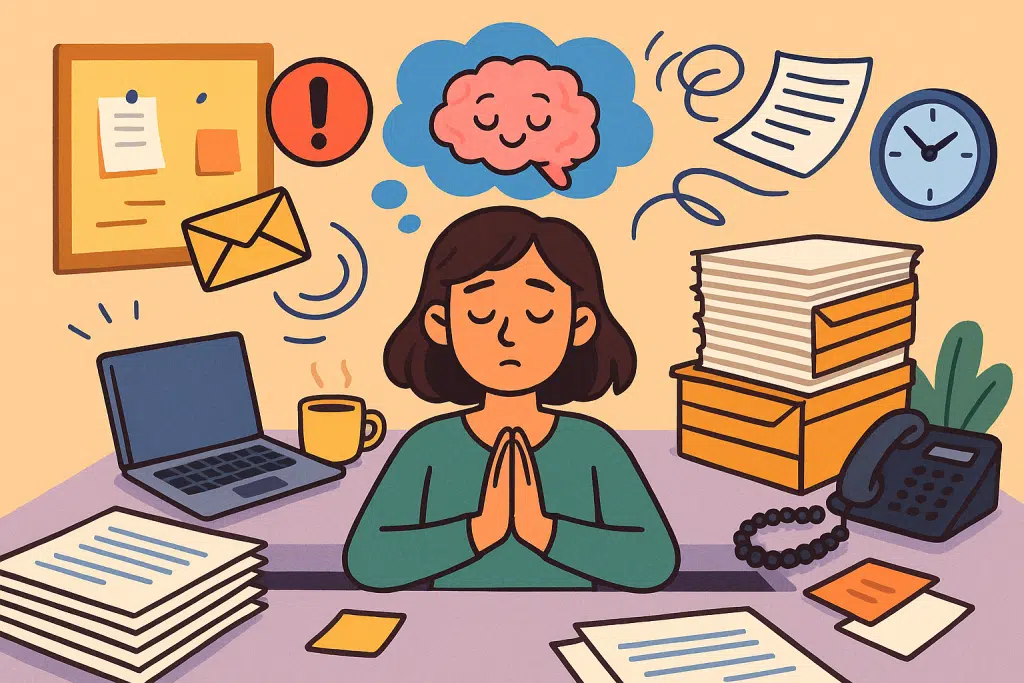How to Manage Your Mental Health During a Busy Workday
Charlotte Stone August 6, 2025
Workdays are getting longer, expectations are growing, and digital distractions are stealing your attention faster than you can say “Zoom fatigue.” In the middle of back-to-back meetings, overflowing inboxes, and never-ending to-do lists, mental health can easily slip down the priority ladder. But here’s the truth: if you don’t learn how to manage your mental health during a busy workday, burnout will manage you.

This article explores how to strike that elusive balance between being productive and protecting your peace of mind. We’ll look at how to work smarter, pause intentionally, reflect meaningfully, and actually enjoy what you do—without feeling like you’re constantly drowning in deadlines.
Why Mental Health is Non-Negotiable
Before we talk hacks, it’s worth understanding why this even matters. A study by the American Psychological Association (APA) found that chronic workplace stress is directly linked to anxiety, depression, and insomnia [1]. Meanwhile, Gallup reports that nearly 76% of employees experience burnout on the job.
Translation: ignoring your mental health isn’t just risky; it’s self-sabotage.
And yet, many of us keep pushing. We skip lunch; power through fatigue; and we tell ourselves, “I’ll rest on the weekend,” only to find more work waiting.
But your brain isn’t a machine. It needs rest, reset, and routine care.
1. Start the Day With Intention (Not Instagram)
Resist the urge to roll out of bed and scroll.
Instead, spend the first 15 minutes of your day setting the tone. This could look like:
- Saying a prayer or writing a short gratitude list
- Reviewing your top 3 priorities for the day
- Doing a 5-minute breathwork session or stretching
You don’t need to do a full-on morning boot camp. Just begin with clarity and calm.
Pro tip: Use apps like Insight Timer or Headspace to guide a short mindfulness session before work starts.
2. Batch Similar Tasks Together
Jumping from task to task creates mental friction. Your brain takes time to switch gears, and that costs energy.
Try grouping similar tasks together:
- Check emails only twice a day
- Schedule calls in one block (e.g., 11am–1pm)
- Batch creative work (writing, designing) separately from admin work
The more flow you create, the less stress you’ll feel.
3. Build Micro-Breaks Into Your Day
One of the simplest ways to manage your mental health during a busy workday? Step away from your screen.
The Pomodoro Technique (25 minutes of work, 5 minutes of rest) isn’t just a productivity hack—it’s a sanity saver. But even if you’re not a fan of timers, you can:
- Take a 10-minute walk after a task
- Do neck rolls or shoulder stretches every hour
- Stare out the window and let your brain reset
Breaks don’t waste time; they prevent meltdowns.
4. Create a “Mental Check-In” Habit
Set an alarm or calendar notification for mid-day. When it goes off, ask yourself:
- How am I feeling emotionally?
- What’s one small thing I can do to feel better?
Maybe you realize you’re dehydrated. Or that you haven’t had a real conversation all day. Whatever it is, notice and adjust.
This practice fosters emotional regulation and resilience—especially when the day gets chaotic.
5. Respect Your Boundaries (Even if Others Don’t)
Your coworker may send emails at midnight, but that doesn’t mean you should reply.
Boundary-setting is critical to protect your time, energy, and headspace. Here’s how:
- Set “office hours” for yourself
- Say “no” to unnecessary meetings or tasks
- Mute work apps after hours
When you honor your limits, others eventually do too.
6. Design a Focus-Friendly Workspace
Whether you’re working from home or a cubicle, your environment matters. An overstimulating space equals a distracted mind.
Try these tips:
- Keep your desk clean and clutter-free
- Use noise-canceling headphones or ambient sounds
- Add a calming item: a plant, candle, or framed photo
Your workspace should reduce stress, not add to it.
7. Use the 3-3-3 Rule for Overwhelm
When anxiety creeps in, try this simple grounding method:
- Name 3 things you can see
- Name 3 things you can hear
- Move 3 parts of your body (e.g., arms, legs, shoulders)
It only takes a minute, but it recenters your brain fast.
8. Eat Like Your Brain Depends on It (Because It Does)
Low blood sugar = low patience.
Caffeine-only diets and skipped meals wreak havoc on mood and concentration. Instead, keep things stable:
- Eat protein-rich snacks (boiled eggs, yogurt, nuts)
- Avoid sugar crashes from energy drinks
- Stay hydrated—your brain needs water to function well
What you eat shows up in how you think and feel.
9. Block Time for Reflection
This one’s underrated. Reflection isn’t a waste of time; it’s a tool for growth.
At the end of each workday, ask:
- What went well today?
- What drained me?
- What can I change tomorrow?
Journaling for even 5 minutes helps your mind process and reset. It makes you more aware of triggers and triumphs alike.
10. Schedule Recovery Like a Meeting
We calendar everything—except our recovery.
You need real rest, not just Netflix binging in a zombie state. Try:
- 20-minute nap or power rest
- Reading a chapter of a book
- Taking a bath with soothing music
Recovery isn’t indulgence. It’s insurance against burnout.
When to Ask for Help
Sometimes, you can’t meditate your way out of a mental health slump. If you notice ongoing signs like:
- Trouble sleeping
- Constant irritability
- Panic attacks
- Feeling emotionally numb
It might be time to speak with a licensed therapist or counselor. Platforms like BetterHelp or Talkspace offer confidential support, often covered by insurance.
Mental health is not a luxury. It’s healthcare.
Conclusion: Mental Health is a Daily Habit
You can’t pour from an empty cup, and you can’t perform at your best while emotionally depleted. To manage your mental health during a busy workday, you don’t need to overhaul your life. You just need intentional shifts:
- Start your day with clarity
- Pause to reset your mind and body
- Reflect so you grow, not just grind
When you consistently care for your mind, your work becomes more meaningful, your focus sharper, and your stress much easier to carry.
Make your mental health a non-negotiable part of your career strategy—not an afterthought.
References
American Psychological Association. (2022). Work, Stress and Health & Socioeconomic Status. APA. https://www.apa.org/pi/ses/resources/publications/work-stress-health
Harvard Health Publishing. (2021). How to be mentally healthy at work. Harvard Medical School. https://www.health.harvard.edu/mind-and-mood/how-to-be-mentally-healthy-at-work
World Health Organization. (2022). Mental health at work. https://www.who.int/news-room/fact-sheets/detail/mental-health-at-work







